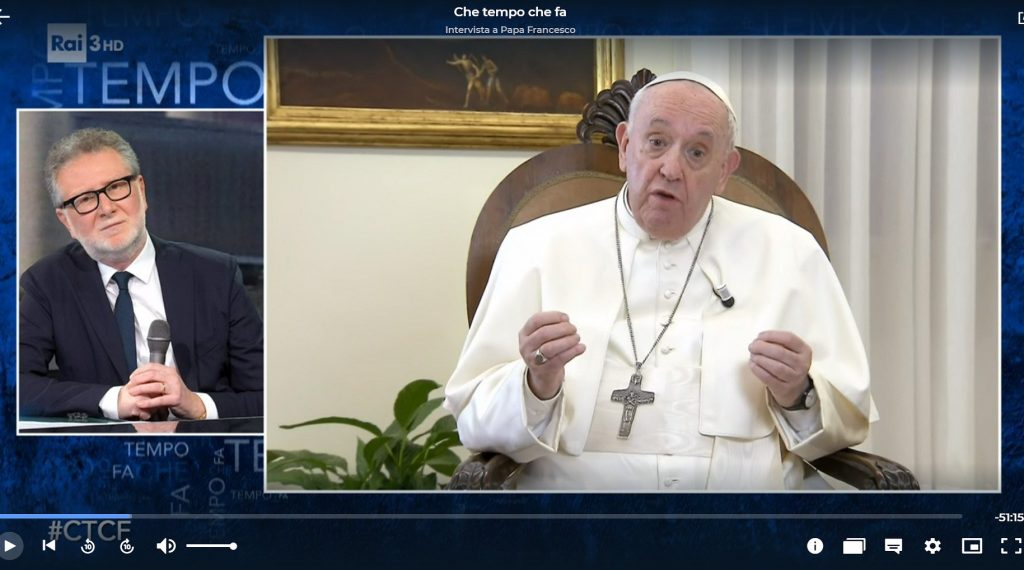In a new interview with an Italian broadcast network, Pope Francis cautioned against spiritual ills such as gossip and spiritual worldliness, saying the latter does the greatest harm to the Church because it feeds clericalism.
Asked about his vision for the future of the Catholic Church and the biggest problem with it today, the pope said he imagines the future Church as it was described by Pope Paul VI in his 1975 encyclical, Evangelii Nuntiandi, as “a Church on pilgrimage.”
As for the Church’s biggest problem, Francis said “the greatest evil in the Church is spiritual worldliness. It’s the worst thing that can happen to the Church, worse than the libertine popes,” many of whom were guilty of various forms of corruption.
Spiritual worldliness, the pope said, “makes clericalism grow,” and clericalism, he said, is “a perversion of the Church” which leads to different forms of “rigidity.”
“Clericalism generates rigidity, and under every rigidity there is something putrid. Spiritual worldliness generates clericalism which leads to rigid, ideological positions, where ideology takes the place of the Gospel,” he said.
Pope Francis spoke during a recorded interview that was shown during Italian state broadcaster RaiTre’s Che Tempo Che Fa program, shown Sunday night.
In the interview, the pope touched on several topics on which he has been outspoken, including migrants, the environment, the dangers of gossip, and closeness to those who suffer.
On a personal level, he admitted to host Fabio Fazio that his first childhood dream job was to be a butcher, and that his favorite music consists of the classics and tango, which he also danced when he was young.
Jesting about being a porteño, meaning a “port city person” usually referring to someone from Buenos Aires, he said that “a porteño who doesn’t dance tango is not a porteño.”
Asked about the 12 migrants recently found frozen to death near the Turkey-Greece border, Francis said this is “a sign of the culture of indifference,” which is an illness “we are sick” with.
This indifference, he said, begins with the “problem of categorization” and the fact that for many, “children, migrants, the poor, those who don’t have anything to eat, don’t count, they are the lower categories, they aren’t in first place.”
“In the universal imagination what counts is war. With one year without making weapons, the world could be fed and educated freely, but this is in second place,” he said, and urged European countries to make an honest evaluation and commitment for how many migrants they can take.
“Italy and other countries need people,” he said, adding, “an integrated migrant helps that country.”
On the environment, the pope lamented that humanity often sees itself as “omnipotent in front of the earth.”
“We must take charge of Mother Earth,” he said, noting that the fisherman of San Benedetto del Tronto once came to him saying they had cleaned several tons of plastic from that part of the sea.
“Throwing plastic into the sea is criminal, it kills,” Pope Francis said.
He urged faithful to be close to those who suffer, and again voiced sorrow over the suffering of children, which is something he said he has asked God about, but still fails to understand. With no answer to such a troubling question, Francis said the only thing to do on this point “is to suffer with them.”
On the topic of gossip, which he has often condemned and urged faithful to refrain from, the pope said this is where division and even wars begin, rooted in a “destructive aggression” that is so characteristic of modern society.
“Destructive aggression is a social problem,” he said, noting that social aggression has been studied at length by psychologists.
Pope Francis refrained from offering further comment on the issue, as he is not an expert, but he pointed to the growing number of youth suicides and the problem of bullying in schools, whether online or in person, saying “aggression must be educated.”
“There is positive and destructive aggression,” he said. “It starts with a small thing, with the tongue, with gossip. Gossiping in families, between people, destroys identity. No to gossip, if you have something against the other, either you eat it or you go and tell them to their face, it takes courage.”
Asked if there is ever something a person can’t be forgiven for, the pope said no, noting that God gave humanity free will, and each person is capable of doing good or evil.
“We are free and masters to make our own decisions, even wrong ones,” he said, but stressed that “the ability to be forgiven is a human right, we all have the right to be forgiven if we ask for forgiveness.”
Pope Francis in the interview also spoke of what it means to pray, his friendships, and said he doesn’t watch TV.
On his friends, the pope said he has “few friends, but true ones. I like to be with them. I need friends. This is why I did not live in the pontifical palace.”
Francis said his predecessors “were saints,” but jested that “I’m not that holy, I couldn’t have done it … I like living with people, it’s easier.”

